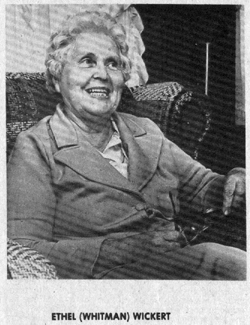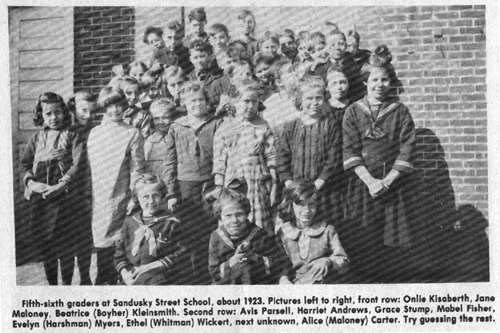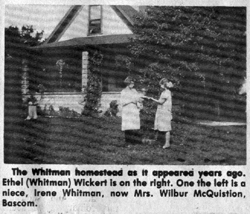October 8, 1981



Picture #3 – The Whitman homestead as it appeared years ago. Ethel (Whitman) Wickert is on the right. On the left is a niece, Irene Whitman, now Mrs. Wilbur McQuiston, Bascom.
Today, I introduce readers to Ethel Wickert, another area writer of poetry.
Brief samplings of her work have appeared in other area newspapers…and a copy of her book “More Truth Than Poetry” is at Fostoria Kaubisch Library. But today she is introduced as a native Fostorian, who went to school here until 1926, plus other events about her life which will interest those who knew her when she was a local youngster.
Mrs. Wickert came to Fostoria recently to visit her niece and husband Mr. and Mrs. Richard Biller, Springville Ave, and I was there to meet her and record the data for today’s article.
Before I tell you how she started to write poetry and about her role as a mother, and other events in her life, you should know that as a child she was Ethel Whitman and lived on Buckley Street. She went to Sandusky Street School when Miss McCormick, Mamie Cramer, Fern Augustine, Fran O’Harris and Ruth Krupp were teachers there.
The one accompanying photo shows pupils in the fifth and sixth grades at that school, and identifies those in the first two rows. Readers who went to that school may recognize others.
Her father was J.T. Whitman, a plasterer by trade. The house where the family lived from 1913 to 1926 is still there. Driving down that street it can be seen at the rear and right of the Ad-Mar Printing building. Back then the house had six acres surrounding it, which contributed to the family food supply.
Mrs. Wickert’s poem “Going Back” provides a nostalgic glimpse of the family property then (see accompanying photo). That poem is reprinted here within:
GOING BACK
I have often heard say, you can never go back,
There’s no use in trying to retrace your track,
But I wanted to see the old homestead once more,
The place where I’d live, as a child years before.
I slackened my steps, as it came into view,
It no longer looked like the place that I knew.
The row of sweet cherries, the old Bartlett pear,
The pines in the front yard where no longer there.
I thought of the times back and forth I had swung,
In the old tire swing, that from low branches hung.
I stood and I sighed, as eyes circled the lawn,
The smoke house, the corn crib, the barn were all gone;
The pump where we’d stopped for a cool drink at play,
And washed our bare feet, at the end of the day,
The hen house, the orchard, the big barnyard gate,
Had all disappeared as they too met their fate.
I glanced at the house – It was all that remained,
A flood of fond memories, my longing heart pained.
I thought of years past, and I inwardly cried,
How I wished once again, I could just go inside.
But I turned, and I walked slowly, sadly away,
On sights once familiar, I let my eyes stray.
But everything now seemed so different, and strange,
It was hard to believe, there could be such a change.
The pond where we skated, which once seemed so wide,
Now such a short way, to the opposite side.
The hill where we’d coasted, was once steep, I knew,
But somehow that hill must have shrunk as I grew.
I’d hope the old homestead, would still be the same,
But now looking around, I was sorry I came.
That well-known old adage, was only too true,
‘Twould never again, but the same there, I knew.
Man’ weather and time had together defiled,
The place that I loved, where I lived as a child.
GIRLHOOD HOME REMAINS
The photo of the Wickert house, back then, will help readers understand the poet’s love for it. The pond mentioned in the poem was an actual pond where kids used to skate, located just a little south of Sandusky Street, about opposite where the Fostoria Pet Hospital is today.
When Ethel was in the eighth grade, her father found his trade becoming too much for him, so the family moved to a farm near the Mull covered bridge on Wolf Creek. From there they moved to Old Fort where Ethel graduated from high school, and has lived ever since.
It was during those school years when teachers assigned poetry as part of school work that Ethel was introduced to it, and as she says now, “started to write silly little things, and class songs for school”. Your author is sure, after reading her book of “More Truth Than Poetry”, that Ethel has made use of a God-given talent, for the betterment of mankind.
What is good music? What is good Art? What is good writing? I guess there are certain standards for all of those endeavors, but to me the real answer rests with the listener, the viewer, the reader.
HER START IN POETRY
Mrs. Wickert started to write her poetry seriously as an outlet for the frustrations she had as a mother. She doesn’t claim to have a superb form which she follows. “I just do what comes naturally”, she says. Her philosophy for writing is set forth in her poem, “Defeated Before We Start”
In her book, Ethel compares with Edgar Guest, one of the great popular writers of poetry of this age. Her works cover a variety of subjects – everyday happenings about her family, hobbies, her childhood, travel, etc.
Though she titled her book, “More Truth Than Poetry”, she says some of the poems stretch the truth…just a little, since it is necessary to include a few things to make them rhyme. Call it exaggeration.
WORKED, RAISED FAMILY
Mrs. Wickert has experienced a full life. She worked for 40 years at Ohio Bell Telephone office, Fremont. During that time I took six leaves of absence to have three boys and three girls, she said.
Now that she is retired, she is often invited to present programs at clubs and senior citizen meetings. She knows most of her poems by memory. As the Review Times photographer snapped a series of views of her she sat, relaxed, smiling and recited a poem for him.
One of her sons, Jim, is presently located in Australia, and she went to visit him there. That visit prompted her to write “Vacation” about the land down under. She has traveled extensively since retirement, coast to coast and foreign lands, and always has her instamatic with her to “snap” things. So, she has a poem “The Amateur Photographer”.
LAUGHS AND PATHOS
Here are a few of the titles of poems in her current book:
“The Comic Strips” about Freckles, Katzenjammer Kids, Popeye, Maggie & Jiggs, Happy Holligan and Barney Google.
“Chewing Gum” Every mother has experienced gum around the house, and Ethel tells it all.
“The Farmer’s Wife” tells delightfully about a typical day in the life of a farm wife.
“Two Hundred Years” written as a tribute on this nation’s birthday in 1976, which ends “It’ll take a lot to meet the test, the next 200 years”.
“His First Performance” about one of her little boys in a Bible School program and the way little ones act and perform. Her little one was supposed to say, “He careth for me,” but it sounded like “Eat carrots for me” when it came out.
“The Dew Worm Hunter”, “Going Barefoot”, “My Fuzzy Old Bathrobe”, “The Sweet Apple Tree”, “Snow Bound”, “Pie Dough Dilemma”, “Ignorance Isn’t Bliss”, “Growing Old”, “The Old Vacant House”, “The Dining Room Table” and many more.
I wish there was space to print more of the poems from her 95 page book, copyrighted and printed in 1980, now in its second printing. Readers who want to read more of her delightful poems will have to get a copy at the library or purchase a copy from her niece, Mrs. Richard Biller, Springville Avenue.
Currently she is writing a poem a day for a second book.